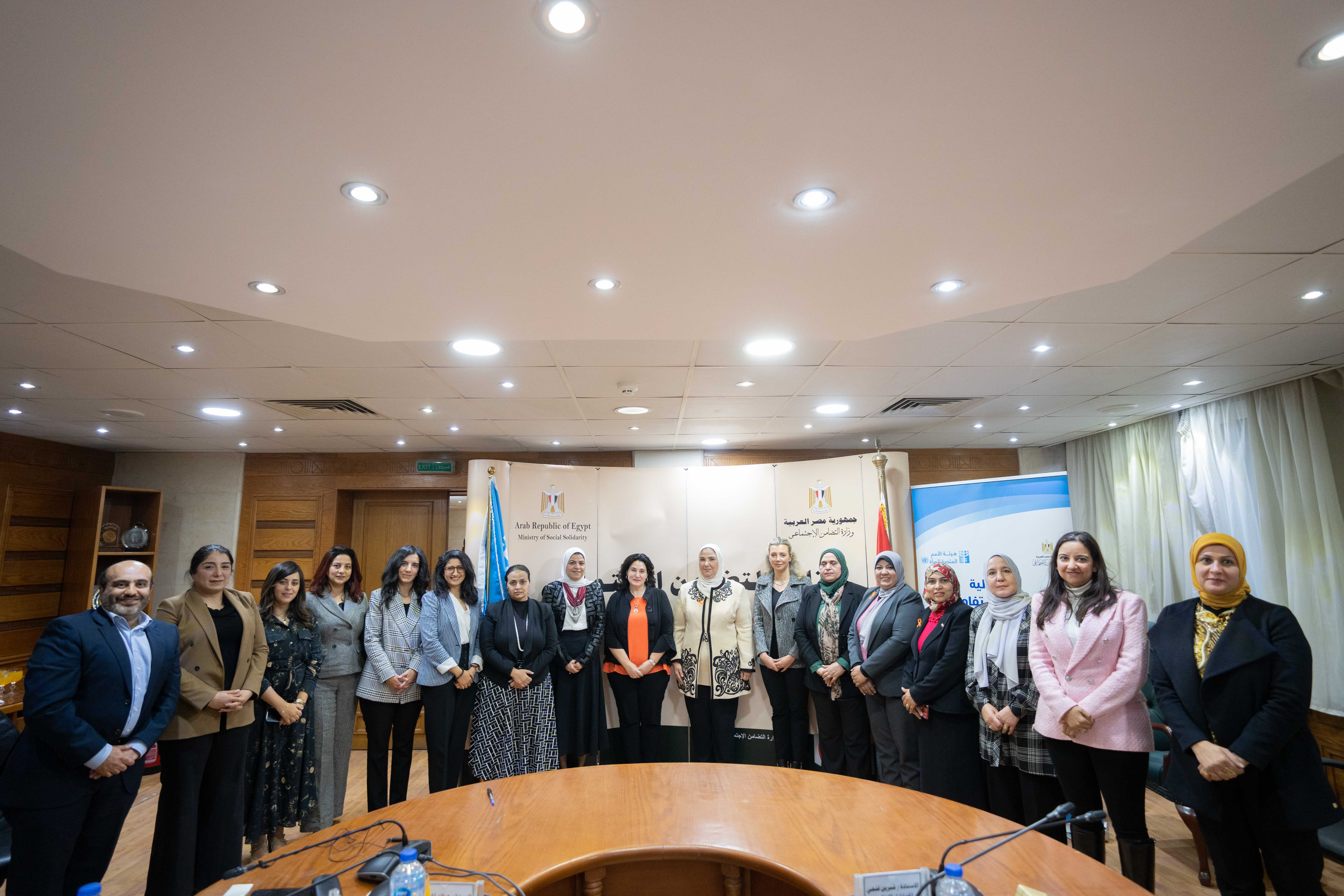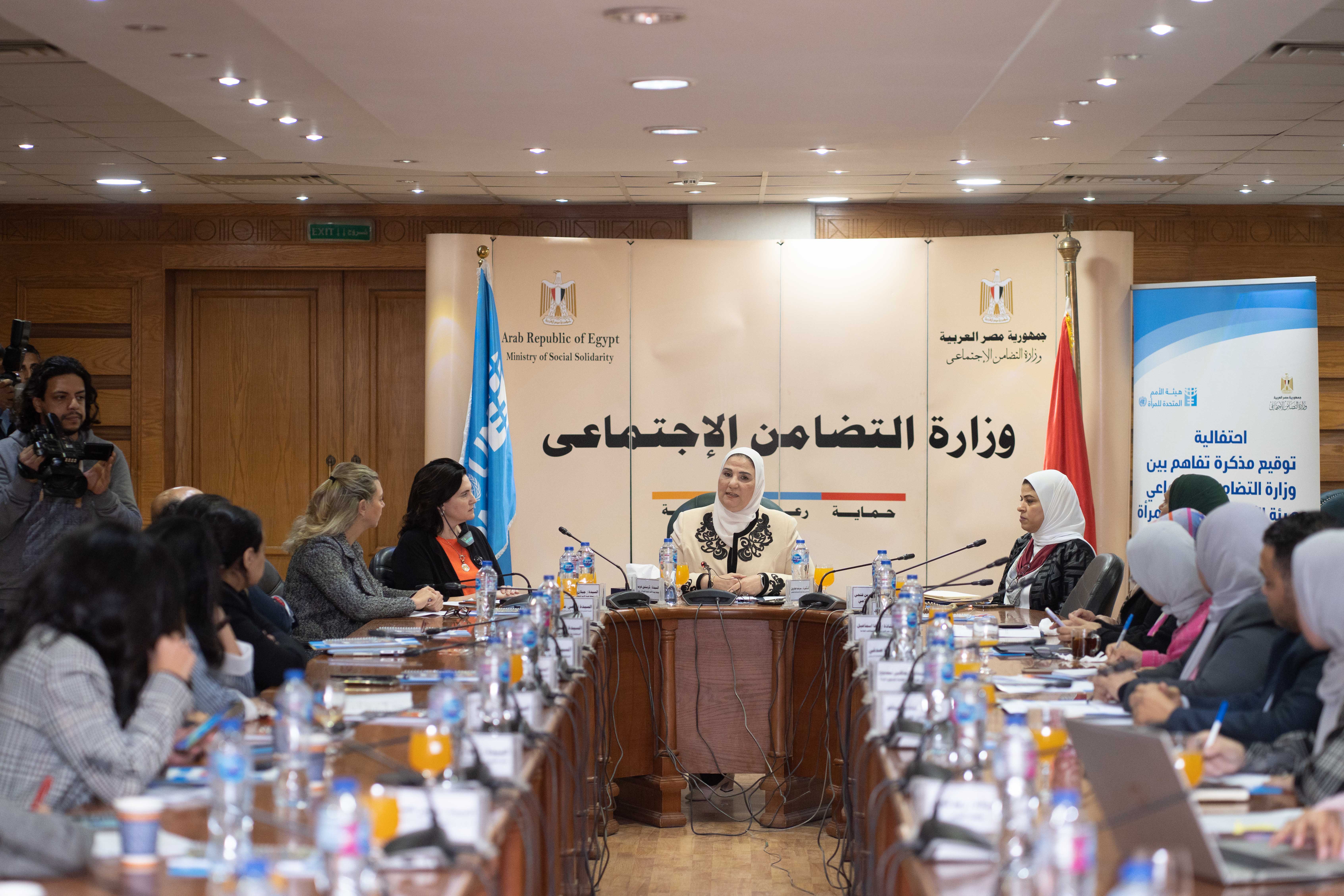The Ministry of Social Solidarity and UN Women Egypt Signs a Partnership Agreement to Enhance Women’s Empowerment and Increase Investments in the Care Economy for Inclusive and Sustainable Growth in Egypt
Date:

In support of the 16 Days of Activism against Gender-Based violence, the Ministry of Social Solidarity signed a partnership agreement with UN Women Egypt to support the Ministry in its strategic objective of increasing investments in the care economy to promote gender equality, particularly through facilitating women’s labour force participation, human development and inclusive and sustainable growth in Egypt.
This partnership was signed in the presence of H.E. Dr. Nevine El-Kabbaj, Minister of Social Solidarity, Ms. Christine Arab, UN Women Country Representative, and Ms. Gielan El Messiri, UN Women Deputy Country Representative.
During the event, a documentary film about "Tafra" programme was screened. This programme provides training for home helpers, where the Ministry handed out graduation certificates and work supplies to a number of trainees, in addition to honoring a number of social women leaders, who were distinguished by the "Tafra" programme for training home helpers in 8 different governorates.
The proposed joint partnership aims to strengthen the capacity of the Ministry of Social Solidarity to apply the UN Women-ILO Policy Support Tool for Estimating Care Deficits, Investment Costs and Economic Returns to the Egyptian context to foster greater awareness of the potential of investments in the care economy to meet multiple national development priorities. Furthermore, the partnership aims to strengthen the capacities of the ministry’s Working Women Service Centers and to promote decent work for domestic workers through increasing their awareness of their socio-economic rights and the available national mechanisms for obtaining support.

In her remarks, the Minister of Social Solidarity stated that this partnership reflects the Ministry’s focus area in investing in the care economy sector, which is not only one of the most important potential sectors in supporting the achievement of economic growth in Egypt, but also the widest sector in providing opportunities for women’s economic empowerment; either directly by providing them with decent job opportunities in the fields of health, education, or even paid care, or indirectly by alleviating the unpaid domestic chores that women bear the burden of carrying out by providing affordable and quality care services.
El-Kabbaj also highlighted that the value of Egyptian women's unpaid work is estimated at about 30% of the country's GDP, in addition to women bearing an additional burden. Therefore, the care economy is considered a productive sector, a source of job creation, and a means to support equal employment opportunities for women, as the sector includes many employment opportunities for women, the most important of which are in the fields of education, nursing, childcare, care for people with disabilities, long-term care, elderly care, as well as domestic work.
The Minister of Social Solidarity explained that from this standpoint, the Ministry seeks to develop its various services that contribute to reducing the burden of unpaid care work on women and supporting their effective participation in the labor market.
“In Egypt, the majority of women attain good levels of education, but this has not translated into high labour force participation rates. We see progress in women getting into diverse sectors in Egypt and important measures to enhancing women’s leadership in the private sector. The challenge to women’s overall labour force participation rates often rests with balancing two roles that women value -their family and their livelihood, stated Ms. Christine Arab; UN Women Egypt Country Representative.
Ms. Arab added “Women can’t be an active part of the labour force without system-wide support of their unpaid care work in the home. At the same time, the fastest growing private sector industry in Egypt according to UN Women/ERF study is the care economy and women dominate in the care economy so there is an enormous opportunity for women to have decent and sustainable employment”.
She concluded her remarks saying “Our work on the care economy is made possible through the generous support of the governments of Switzerland, Sweden and Canada”.